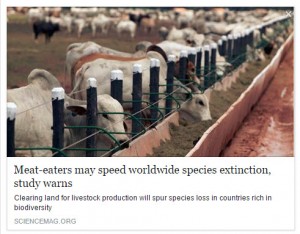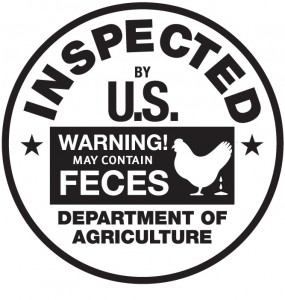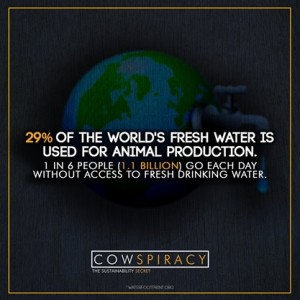Antibiotic Resistant Superbugs: Yet Another Way Meat Eating is Killing this Planet
Leave aside the sheer cruelty of the meat industry: How billions of living beings are being subject to the most inhumane treatments. Not being allowed to live a real life, but being born, grown and murdered in a small cell. Leave aside the fact that meat farms are the main reason for Global warming which has brought us to the brink of extermination. Or the fact that the meat industry is responsible for the destruction of most of the primal rain forests and extinction of a large percentage of species. Or even how with artificial hormones injected into cows, you are literally eating poison and that meat is one of the main reasons for increased cancer rates. Or the slightly humorous fact that up to 2% of most meat you eat is literally fecal matter (which is a polite way of saying you are literally eating shit).
Now meat eating is destroying the planet in an altogether new and novel way according to this article by Dr. Michael Greger M.D: Antibiotic-Resistant “Superbugs” in Meat
According to the World Health Organization, more antibiotics are fed to farmed animals than are used to treat disease in human patients. Doctors overprescribe antibiotics, but huge amounts of antibiotics are used in fish farming and other intensive animal agriculture, up to four times the amount used in human medicine.
Why? “Suboptimum growth to slaughter weight caused by unsanitary conditions can be compensated with the addition of antibiotics to feed.” Instead of relieving any stressful overcrowded unhygienic conditions, it may be cheaper to just dose the animals with drugs. When animals receive unnecessary antibiotics, bacteria can become resistant to the drugs, then travel on meat to the store, and end up causing hard-to-treat illnesses in people.
The CDC estimates that, at a minimum, more than two million people are sickened every year with antibiotic-resistant infections in the United States, with at least 23,000 dying as a result
Achievements in modern medicine that we today take for granted, such as surgery and the treatment of preterm babies, would not be possible without access to effective treatment for bacterial infections. For example, without antibiotics, the rate of postoperative infection after a procedure like a hip replacement would be 40-50% and about one in three of those patients would die.
So, the so-called worst case scenarios where resistant infections could cost $50 billion a year might still be an underestimate.
- Animal Cruelty is the Price We Pay for Cheap Meat,
http://www.rollingstone.com/..meat-factory-farms-animal-activists, Paul Solotaroff - Meat-eaters may speed worldwide species extinction, study warns,
http://www.sciencemag.org/…, Science Mag - How Meat Contributes to Global Warming,
http://www.scientificamerican.com/…hamburger/, Scientific American - Meat-eaters soak up the world’s water,
http://www.theguardian.com/environment/…23/water.famine, The Guardian, UK - What’s in your meat? Drugs, cleaning chemicals, hormones, antibiotics, heavy metals, toxins and bacteria!,
http://www.seattle…drugs-chemicals-hormones-antibiotics-heavy-metals-in-red-meat-fish-poultry.php, Seattleorganicrestaurants - Hamburger meat almost always contains poop,
http://theweek.com/…meat-almost-always-contains-poop, TheWeek
And NOW !
Antibiotic-Resistant “Superbugs” in Meat, http://nutritionfacts.org/2016/03/10/antibiotic…, Michael Greger M.D
As a rule, “high-ranking public-health officials try to avoid apocalyptic descriptors. So, it’s worrying to hear those like the Director of the CDC warn of a coming health ‘nightmare’ and a ‘catastrophic threat.’” A number of prominent publications recently warned of the threat of antibiotic resistance. The CDC estimates that, at a minimum, more than two million people are sickened every year with antibiotic-resistant infections in the United States, with at least 23,000 dying as a result (See MRSA Superbugs in Meat).
We may be at the dawn of a post-antibiotic era. Achievements in modern medicine that we today take for granted, such as surgery and the treatment of preterm babies, would not be possible without access to effective treatment for bacterial infections. For example, without antibiotics, the rate of postoperative infection after a procedure like a hip replacement would be 40-50% and about one in three of those patients would die. So, the so-called worst case scenarios where resistant infections could cost $50 billion a year might still be an underestimate. “From cradle to grave, antibiotics have become pivotal in safeguarding the overall health of human societies.”
So, the dire phrasing from head officials may be warranted. There are now infections like carbapenem-resistant enterobacter that are resistant to nearly all antibiotics, even to so-called drugs of last resort. Worryingly, some of these last resort drugs are being used extensively in animal agriculture.
According to the World Health Organization, more antibiotics are fed to farmed animals than are used to treat disease in human patients. Doctors overprescribe antibiotics, but huge amounts of antibiotics are used in fish farming and other intensive animal agriculture, up to four times the amount used in human medicine. Why? “Suboptimum growth to slaughter weight caused by unsanitary conditions can be compensated with the addition of antibiotics to feed.” Instead of relieving any stressful overcrowded unhygienic conditions, it may be cheaper to just dose the animals with drugs.
In this way, factory farms are driving the growth of antibiotic-resistant organisms that cause human diseases. “This may help bolster the industry’s bottom line, but in the process, bacteria are developing antimicrobial resistance, which affects human health.”
The FDA reports that 80% of antimicrobial drugs in the United States are used in food animals, mainly to promote growth in this kind of high-density production. This can select for antibiotic-resistant bacteria like methicillin-resistant Staph aureus, or MRSA, considered a serious threat in the United States.
These industrial pig operations may provide optimal conditions for the introduction and transmission of MRSA. U.S. pork producers are currently permitted to use 29 antibiotic drugs in feed—all without a prescription. Antibiotics are currently added to about 90% of pigs’ starter feeds.
When animals receive unnecessary antibiotics, bacteria can become resistant to the drugs, then travel on meat to the store, and end up causing hard-to-treat illnesses in people.
MRSA present in retail raw meat may serve as a possible source of bacterial infections of food preparers in the food industry and the hands of consumers in the home. Once MRSA gets into our homes on meat, it can transfer to our cutting boards, knives, and onto our skin at a rate similar to the rate of transmission from touching an infected patient contaminated with MRSA. Washing of hands after touching raw pork is advised.
I know I’ve already covered this topic, but it never fails to shock me that the meat industry can get away with something so forcefully and universally condemned by the public health community. What other industrial sector could get away with putting people at such risk? It speaks to the combined might of the livestock industry and the pharmaceutical industry in holding sway over our democratic process, no matter what the human health consequences.
If you’ve missed my other MRSA videos, check out:
And for more on this critical issue in general:
In health,
Michael Greger, M.D.













